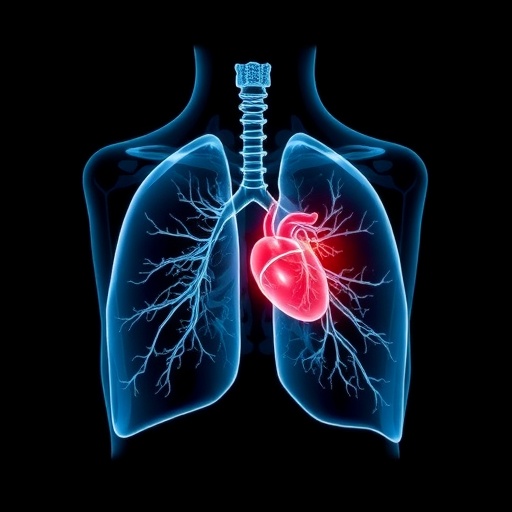
Learning from Every Patient: A Revolutionary Radiotherapy Technique to Shield the Heart in Lung Cancer Treatment
Lung cancer remains one of the deadliest forms of cancer worldwide, with radiotherapy standing as one of its most potent curative treatments. However, the therapeutic challenge lies in eradicating tumours without inflicting undue damage to the surrounding vital organs, particularly the heart. Recent advances showcased at ESTRO 2025 unveil a groundbreaking study, RAPID-RT, which pioneers a novel “rapid-learning” methodology designed to minimize cardiac exposure during lung cancer radiotherapy. This approach not only redefines trial inclusivity but also proposes a paradigm shift in how radiotherapy treatments are optimized in real-world clinical settings.
Radiotherapy’s efficacy in lung cancer treatment is undeniable, yet it comes with inherent risks linked to the proximity of the heart to thoracic tumours. Radiation-induced cardiac toxicity has long been a formidable obstacle, often leading to detrimental outcomes affecting patient survival and quality of life. In Manchester, an innovative radiotherapy planning analysis identified a particular vulnerability: the upper region of the heart exhibits heightened radiosensitivity and a strong correlation between radiation dose to this area and overall patient survival. These insights have compelled researchers to recalibrate radiation delivery protocols, focusing on “heart-sparing” techniques.
The RAPID-RT study, spearheaded by The Christie NHS Foundation Trust in Manchester, applied this heart-sparing strategy prospectively in a large cohort of lung cancer patients. What distinguishes this investigation is its rapid-learning design— an adaptive, data-driven approach integrating anonymized patient data in near real-time, thus bypassing the delays and restrictive enrollment often typifying conventional clinical trials. By embracing inclusivity, the study amassed data from over 1,700 individuals, making it a powerful lens into routine clinical practice outcomes rather than artificial trial conditions.
In practical terms, the heart-sparing technique involves delineating a precise Cardiac Avoidance Area (CAA) within the upper heart, limiting radiation doses to no more than 19.5 Gray (Gy) over treatment courses spanning 20 to 33 fractions—unless such dose constraints impaired adequate tumour targeting. This strategy required exquisitely precise radiotherapy planning and delivery, underscoring the critical role of advanced medical physics and imaging technologies in executing treatment modifications without compromising oncologic efficacy.
The findings to date are promising. Prior to April 2023, 922 patients received standard curative radiotherapy, whereas post-implementation, the heart-sparing protocol was used in 786 patients. Remarkably, only a single patient opted out of the data collection, illustrating the acceptance and practicality of the rapid-learning inclusive model. Preliminary analyses reveal a modest but meaningful improvement in 12-month survival rates, suggesting that reducing cardiac irradiation confers tangible benefits—paving the way for further refinements in therapy.
Unlike typical randomized controlled trials that often exclude significant patient demographics to maintain strict criteria and consent complexities, RAPID-RT’s design deliberately embraces the heterogeneity of the clinical population. This ethico-methodological innovation aligns research outcomes more closely with everyday clinical realities, thereby accelerating the translation of research insights into clinical improvements. Such agility in research methodologies represents a new frontier in oncology where learning adapts dynamically from the full spectrum of patient experiences.
Beyond survival metrics, limiting radiation exposure to the cardiac substructures is anticipated to reduce the incidence of late-onset toxicities such as pericarditis, coronary artery disease, and heart failure, which frequently complicate post-radiotherapy recovery. Future analyses from RAPID-RT aim to quantify these long-term benefits, further solidifying the heart-sparing technique as a standard in thoracic radiotherapy protocols.
The methodological backbone of RAPID-RT depends heavily on sophisticated electronic health records and anonymized data integration — technologies that empower clinicians to tailor doses based on ongoing patient responses without waiting for trial endpoints years down the line. This real-time feedback loop enables treatment protocols to evolve responsively and ensures continuous improvement in patient care quality and safety.
Professor Matthias Guckenberger, President of ESTRO, emphasized that this endeavor exemplifies the intersection of technological innovation and adaptive clinical learning. It illustrates how state-of-the-art medical physics, computational modeling, and inclusive research frameworks collectively enhance therapeutic precision, reduce collateral damage, and potentially transform survival landscapes for lung cancer patients.
The implications of the RAPID-RT study are far-reaching, hinting at a future where clinical trials adopt rapid-learning frameworks widely, expediting discovery and implementation cycles. Particularly in fields where randomized trials face logistical and ethical hurdles, this model could democratize evidence generation and foster personalized medicine models grounded in real-world evidence.
As the RAPID-RT cohort continues under longitudinal follow-up, deeper insights into treatment toxicities, survival curves, and quality of life metrics will further elucidate the balance between tumour eradication and organ preservation. The ongoing data analyses will also explore alternative computational models to better understand radiobiological responses within cardiac tissues during lung cancer treatment.
At its essence, the RAPID-RT initiative is more than a technical adjustment; it reflects a holistic reconceptualization of clinical research and cancer therapy. By embedding rapid learning into standard care pathways and prioritizing whole-patient outcomes, the study heralds a new era of smarter, more compassionate oncology, where innovation is driven by every patient’s journey.
Subject of Research: People
Article Title: First RAPID-RT analysis: Using rapid-learning to assess the survival impact of a new cardiac avoidance area during lung cancer radiotherapy
News Publication Date: 5-May-2025
Keywords: Lung cancer, Clinical research, Oncology
Tags: enhancing quality of life for lung cancer patientsESTRO 2025 radiotherapy advancementsheart protection in cancer treatmentheart-sparing techniques in radiation therapyimproving patient survival in lung cancerinnovative cancer treatment approacheslung cancer radiotherapy innovationsminimizing cardiac exposure in radiotherapyoptimizing radiotherapy in clinical settingsradiation-induced cardiac toxicityradiosensitivity of the heartrapid-learning methodology in radiotherapy





